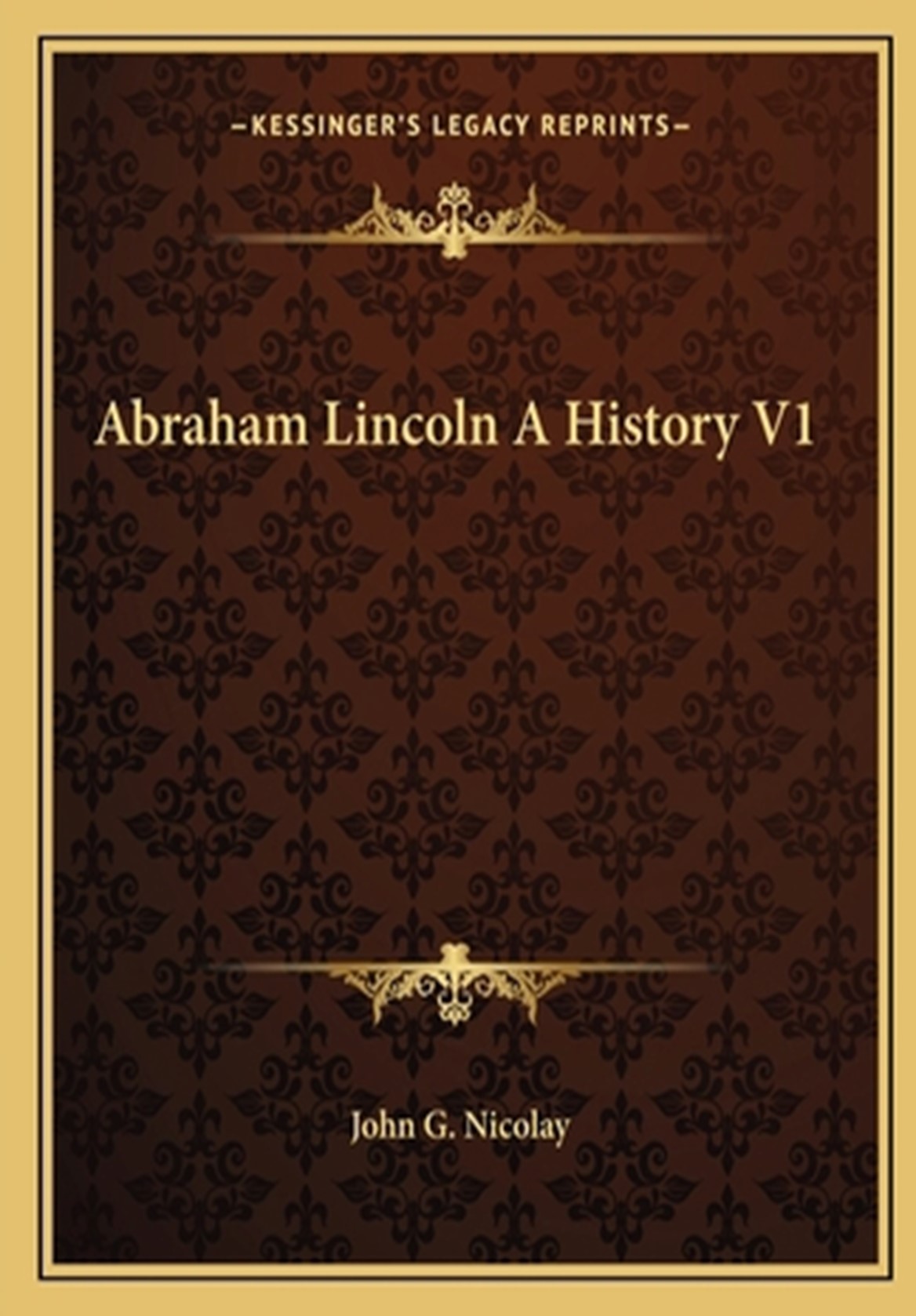Abraham-Lincoln-A-History V1
Author: John G. Nicolay and John Hay
Abraham Lincoln: A History V1 – In the year 1780, Abraham Lincoln, a member of a respectable and well-to-do family in Rockingham County, Virginia, started westward to establish himself in the newly explored country of Kentucky. He entered several large tracts of fertile land, and returning to Virginia disposed of his property there, and with his wife and five children went back to Kentucky and settled in Jefferson County.
Little is known of this pioneer Lincoln or of his father. Most of the records belonging to that branch of the family were destroyed in the civil war. Their early orphanage, the wild and illiterate life they led on the frontier, severed their connection with their kindred in the East.
This, often happened; there are hundreds of families in the West bearing historic names and probably descended from well-known houses in the older States or in England, which, by passing through one or two generations of ancestors who could not read or write, have lost their continuity with the past as effectually as if a deluge had intervened between the last century and this.
Even the patronymic has been frequently distorted beyond recognition by slovenly pronunciation during the years when letters were a lost art, and by the phonetic spelling of the first boy in the family who learned the use of the pen. There are Lincolns in Kentucky and Tennessee belonging to the same stock with the President, whose names are spelled “Linkhorn” and “Linkhern.” All that was known of the emigrant, Abraham Lincoln, by his immediate descendants was that his progenitors, who were Quakers, came from Berks County, Pennsylvania, into Virginia, and there throve and prospered.
Pennypacker, Howard M. Jenkins, and John T. Harris, Jr., for information and suggestions which have been of use to us in this chapter.] But we now know, with sufficient clearness, through the wide-spread and searching luster which surrounds the name, the history of the migrations of the family since its arrival on this continent, and the circumstances under which the Virginia pioneer started for Kentucky.
The first ancestor of the line of whom we have knowledge was Samuel Lincoln,
of Norwich, England, who came to Hingham, Massachusetts, in 1638, and died
there. He left a son, Mordecai, whose son, of the same name, —and it is a name which persists in every branch of the family,
The Lincolns, in naming their children, followed so strict a tradition that great confusion has arisen in the attempt to trace their genealogy. For instance, Abraham Lincoln, of Chester County, son of one Mordecai and brother of another, the President’s ancestors, left a fair estate, by will, to his children, whose names were John, Abraham, Isaac, Jacob, Mordecai, Rebecca, and Sarah—precisely the same names we find in three collateral families.]— Removed to Monmouth, New Jersey, and thence to Amity township, now a part of now a part of Berks County, Pennsylvania, where he died in 1735, fifty years old.
From a copy of his will, recorded in the office of the Register in Philadelphia, we gather that he was a man of considerable property. In the inventory of his effects, made after his death, he is styled by the appraisers, “Mordecai Lincoln, Gentleman.” His son John received by his father’s will “a certain piece of land lying in the Jerseys, containing three hundred acres,” the other sons and daughters having been liberally provided for from the Pennsylvania property.
This John Lincoln left New Jersey some years later, and about 1750 established himself in Rockingham County, Virginia. He had five sons, to whom he gave the names which were traditional in the family: Abraham, the pioneer first mentioned, —Isaac, Jacob, Thomas, and John.
Jacob and John remained in Virginia; the former was a soldier in the War of the Revolution and took part as lieutenant in a Virginia regiment at the siege of Yorktown. Isaac went to a place on the Holston River in Tennessee, Thomas followed his brother to Kentucky, lived and died there, and his children then emigrated to Tennessee. It is an interesting coincidence for the knowledge of which we are indebted to Colonel John B. Brownlow, that a minister named Mordecai Lincoln a relative of the President, performed, on the 17th of May 1837, the marriage ceremony of Andrew Johnson, Mr. Lincoln’s successor, in the Presidency.
With the one memorable exception the family seem to have been modest, thrifty, unambitious people. Even the great fame and conspicuousness of the President did not tempt them out of their retirement. Robert Lincoln, of Hancock County, Illinois, a cousin—German, became a captain and commissary of volunteers; none of the others, so far as we know, ever made their existence known to their powerful kinsman during the years of his glory.
It was many years after the death of the President that his son learned the probable circumstances under which the pioneer Lincoln removed to the West, and the intimate relations which subsisted between his family and the most celebrated man in early Western annals. There is little doubt that it was on account of his association with the, famous Daniel Boone that Abraham Lincoln went to Kentucky. The families had for a century been closely allied. There were frequent intermarriages.
Lincoln, of Birdsboro, Berks County, Pennsylvania, to the writers, says, “My
grandfather, Abraham Lincoln, was married to Anna Boone, a first cousin of
Daniel Boone, July 10, 1760.” He was half-brother of John Lincoln, and
afterwards became a man of some prominence in Pennsylvania, serving in the
Constitutional Convention in 1789-90.
Among them—both being of Quaker lineage. By the will of Mordecai Lincoln, to which reference has been made, his “loving friend and neighbor” George Boone was made a trustee to assist his widow in the care of the property. Squire Boone, the father of Daniel, was one of the appraisers who made the inventory of Mordecai Lincoln’s estate.
READ MUCH MORE INSIDE…362 Pages
Abraham Lincoln: A History V1

Click on the Blue Button Below for Instant Access!
 Our 100% Money Back Guarantee:
Our 100% Money Back Guarantee:
If for any reason you decided within 30 days that “Outdoor Sports and Games” isn’t for you, simply notify us by email and we’ll gladly refund your money – no questions asked. That’s our Ironclad Guarantee! The risk is entirely ours! You absolutely have nothing to lose!
Your name and email will Never be shared, sold, or given to anyone.
We keep our subscriber’s privacy sacred. We do not sell or rent your personal information to other parties. What’s more you can always unsubscribe at any time!
Warmest Regards, Coyalita Linville
Copyright © 2024 https://ebook-emporium.com/.com/
All Rights Reserved – Earnings Disclaimer – Terms of Use – Contact Us

